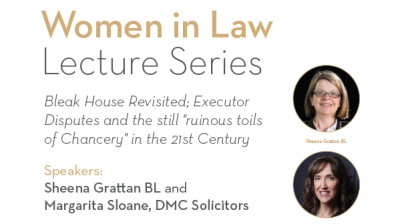NI High Court: Businessman’s claim for financial provision from father’s estate dismissed

Northern Ireland’s High Court has dismissed a businessman’s claim for financial provision from his late father’s estate in circumstances where those parties had a fractured relationship and where he was entirely capable of earning an independent living.

About this case:
- Citation:[2024] NICh 9
- Judgment:
- Court:NI High Court
- Judge:Mr Justice Michael Humphreys
Delivering judgment for the High Court, Mr Justice Michael Humphreys opined: “As the statute makes clear, the court is entitled to take into account the conduct of an applicant under the 1979 Order in determining whether there has been reasonable financial provision. The plaintiff’s conduct has been, as his mother outlined, quite appalling. His relationship with his father was non-existent for years and it cannot be that any moral claim therefore exists.”
Anthony Brennan (instructed by McHugh Lynam) appeared for the plaintiff, and Patrick Lyttle KC and Rory McNamee (instructed by Mallon & Mallon) appeared for the defendants.
Background
The plaintiff was a 55-year-old businessman, married with two children, and was the eldest of six children of the deceased.
Having failed to challenge the validity of his late father’s will in 2022, the plaintiff sought reasonable financial provision from the deceased’s nearly £3 million estate pursuant to Article 3 of the Inheritance (Provision for Family and Dependants) (Northern Ireland) Order 1979.
The deceased’s will provided: “I leave, devise and bequeath everything I own real as well as personal and wheresoever situate to my dear wife Briege absolutely.”
The plaintiff asserted that he was having financial issues and was unable to meet many of his debts. Claiming to be a “loyal and loving son”, the plaintiff asserted a “moral claim” based on his relationship with his father, believing that having worked alongside him from his teenage years he would receive an equitable share of his father’s businesses.
The High Court
Mr Justice Humphreys firstly set out the definition of “reasonable provision” in Article 2(2)(b) of the 1979 Order, “such financial provision as it would be reasonable in all the circumstance of the case for the applicant to receive for his maintenance”.
The judge also focused on Article 3 which provides that following the commencement of the 1979 Order, where a person dies domiciled in Northern Ireland and is survived by inter alia “A child of the deceased … that person may apply to the court for an order under Article 4 on the grounds that the disposition of the deceased’s estate effected by his will or the law relating to intestacy, or the combination of his will and that law, is not such as to make reasonable financial provision for the applicant.”
The court also considered that it was required to have regard to the matters set out in Article 5, which include the financial resources and needs which the applicant and any beneficiary of the estate has or is likely to have in the foreseeable future, and any other matter including the conduct of the applicant or any other person, which in the circumstances the court may consider relevant.
The court also examined Article 5(6), which requires it to take into account, when considering financial need, the applicant’s earning capacity, financial obligations and responsibilities.
The evidence
Mr Justice Humphreys noted that despite the plaintiff’s claims that “things are very tight”, he was able to lodge a £10,000 cash security for a high profile bail applicant in October 2023.
The court also recounted that the plaintiff had accepted under cross-examination that he had made an outrageous allegation of criminal conspiracy against his family, having sent a text to his mother in May 2020 which read “You shall no longer tell lies or keep secrets from me about his death or secrets from me about his death or his estate”.
Observing that it was apparent that the plaintiff harboured “significant animosity” towards his mother, the judge opined: “It is hard to escape the conclusion that these proceedings, and the claim in relation to the deceased’s lack of capacity, were motivated both by his desire for financial gain and also to harm his mother. Both in the aftermath of his father’s death, and during the course of this legal action, he has been quick to accuse his mother of lies and deceit.”
The court considered it curious that the plaintiff called his sister as a witness, who was “wholly antithetical” to his case, and who described the fractured relationship between the plaintiff and his father, and asserted that the plaintiff had played no more part in the deceased’s businesses than any of his siblings.
The plaintiff’s mother recounted that the plaintiff failed to attend his father’s 70th birthday, refused to speak to him at other family events, had treated her appallingly since his father’s death and caused his siblings to contact the police as a result of his behaviour during the deceased’s illness. Mrs McQuaid also told the court that prior to his death, the deceased had stated that the plaintiff should get nothing from his estate.
Consideration
Mr Justice Humphreys highlighted that the burden to establish that the will did not adequately provide for the plaintiff as an adult child rested on the plaintiff.
Considering that the plaintiff was an individual who was fit and able to work and was not maintained by his father prior to his death, the court pointed out that in fact, all of the businesses with which the plaintiff was involved came about “as a result of either his connection with his father or an opportunity which his father gave to him”.
The judge found it noteworthy that none of the deceased’s other children brought any claim against the estate, and commented: “The plaintiff’s conduct has been, as his mother outlined, quite appalling. His relationship with his father was non-existent for years and it cannot be that any moral claim therefore exists.”
The High Court concluded: “The moral claim advanced by the plaintiff is utterly bereft of merit. There is nothing in this case to justify a claim by an adult son who is entirely capable of earning an independent living.”
Conclusion
Accordingly, the High Court dismissed the plaintiff’s claim for relief under the 1979 Order and made an order for costs against the plaintiff.
Conrad McQuaid and Briege McQuaid and Patrick Mallon as Executors of the estate of Terence Benedict McQuaid deceased (No. 2) [2024] NICh 9








